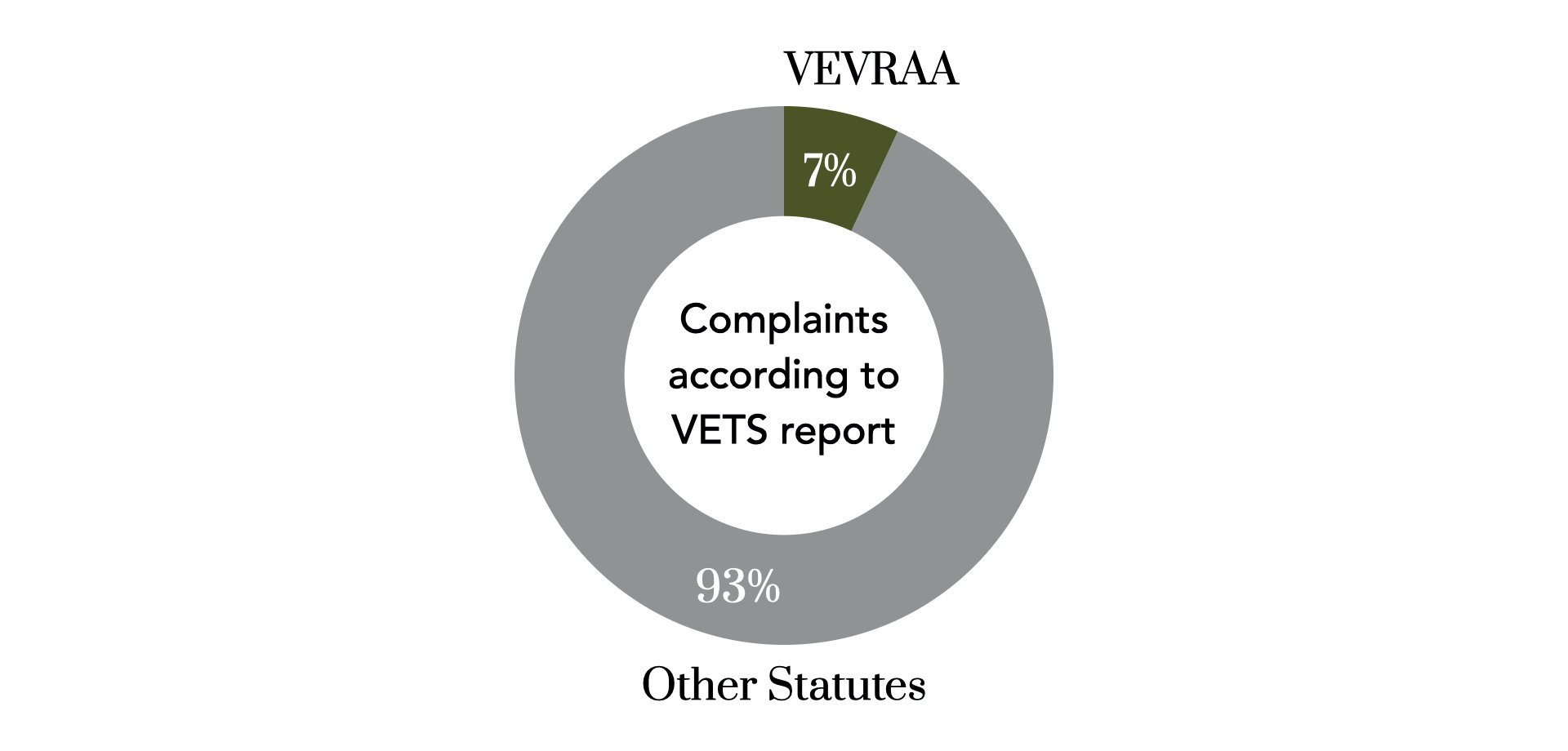VEVRAA Complaints
OFCCP IS WITHHOLDING DAMNING INFORMATION ABOUT DISCRIMINATION COMPLAINTS BY PROTECTED VETERANS.
**This story has been updated here and here.
The Department of Labor is supposed to enforce affirmative action for veterans under a 1972 law known as the Vietnam Era Veterans Readjustment Assistance Act, or VEVRAA. The law, 38 USC § 4212, does not protect peacetime non-disabled veterans, and it only applies to employers with government contracts. Processing VEVRAA complaints falls to DoL’s Office of Federal Contracts Compliance Program (OFCCP).
VEVRAA requires the DoL to submit an annual report to Congress on “the number of complaints filed… the actions taken thereon and the resolutions thereof.” OFCCP is supposed to share enforcement data with the Veterans Employment and Training Service (VETS), which then prepares and files the Congressional reports. VETS reports from 2012 to 2018 are available online here.
DoL has been telling Congress that veterans protected by VEVRAA have filed less than one in ten OFCCP complaints. None of these reports include data on actions taken or resolutions reached, and these reports do not match with other datasets.
The DoL’s “Data Enforcement” webpage provides a far more complete series of datasets that contradict the reports sent to Congress. According to DoL’s “Compliance Evaluation and Complaint Investigation (CECI) Data,” not only are there far more veterans filing VEVRAA complaints, but veterans’ claims are also twice as likely to be denied as other complaints OFCCP processes.
Here is what DoL VETS has been telling Congress about OFCCP enforcement, with links to the reports being quoted:
“In FY 2012, OFCCP processed 66 complaints filed under VEVRAA, accounting for 8 percent of the 780 total complaints processed by the Agency during the year.”
“In FY 2013, OFCCP processed 53 complaints filed under VEVRAA, accounting for 6.7 percent of the 790 total complaints processed by the Agency during the year.”
“In FY 2014, OFCCP processed 45 complaints filed under VEVRAA, accounting for 6.4 percent of the 699 total complaints processed by OFCCP during the year.”
“In FY 2015, OFCCP processed 54 complaints filed under VEVRAA, accounting for 8.2 percent of the 655 total complaints processed by OFCCP during the year.”
2016 report: “OFCCP processed 53 complaints filed under VEVRAA in FY 2016.”
“In FY 2017… OFCCP processed 124 complaints on the basis of VEVRAA.”
“In FY 2018… OFCCP processed 132 complaints on the basis of VEVRAA.”
According to the CECI data, each of these years saw many more VEVRAA complaints filed. Here is what those reports would have said based on the more detailed datasets:
In 2013, OFFCP processed 86 complaints filed under VEVRAA, accounting for 37.07% of the 232 total complaints processed by OFCCP during the year.
In 2014 it was 28 VEVRAA complaints, or 18.92% of 148 total complaints.
In 2015 it was 32 VEVRAA complaints, or 28.07% of 114 total complaints.
In 2016 it was 50 VEVRAA complaints, or 34.01% of 147 total complaints.
In 2017 it was 37 VEVRAA complaints, or 35.24% of 105 total compaints.
In 2018 it was 35 VEVRAA complaints, or 31.25% of 112 total complaints.
In 2019 it was 23 VEVRAA complaints, or 25.84% of 89 total complaints.
How have VEVRAA complaints been trending over time? It depends on which data set you follow.
All told, according to FOIA, there were 2168 complaints “closed” by OFCCP from 2004 to 2019. Nearly one in three of those, or 30.73%, were filed under VEVRAA. Congress, however, is being told that the number of VEVRAA complaints “processed” is less than one in ten.
The CECI data possesses incredible detail, including respondent names and information on violations found and the bases for each complaint. Because the violation data is preserved, we can also determine how often OFCCP finds in favor of veterans and/or VEVRAA complaints, and this is where the picture gets worse.
Taken as a whole, the CECI data shows an agency that is generally lenient. The Equal Employment Opportunity Commission (EEOC), for example, found in favor of complainants 16.52% of the time, whereas OFCCP found violations as a result of 9.23% of all complaints. Since EEOC does not protect veterans, we can remove the VEVRAA complaints for the sake of a more direct comparison. In that case, OFCCP finds violations in 14.74% of complaints.
Broken down by complaint type, OFCCP found in favor of complainants much less often when it was a VEVRAA complaint. Claims under two laws, Executive Order 11246 (EO11246) and Section 503 (§ 503) of the Rehabilitation Act, returned violations at a rate of 15.52% and 13.9%, respectively. OFCCP found violations in “Other” complaint investigations at a rate of 19.23%. But when veterans filed discrimination complaints under VEVRAA, OCFFP only found violations in 7.22% of them.
Can it be true that veterans file false or meritless complaints at a greater rate than other groups? Or is it more likely that DoL is failing to provide equal protection under federal law? If the latter is the case, then it goes a long way to explain why Congress is not being given the whole picture when it comes to 38 USC § 4212.


